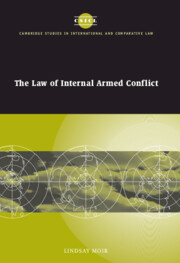Book contents
- Frontmatter
- Contents
- Preface and acknowledgements
- Table of cases
- Table of treaties and other international instruments
- 1 The historical regulation of internal armed conflict
- 2 Article 3 common to the Geneva Conventions
- 3 Additional Protocol II of 1977
- 4 Customary international law and internal armed conflict
- 5 Human rights during internal armed conflict
- 6 Implementation and enforcement of the laws of internal armed conflict
- Bibliography
- Index
- CAMBRIDGE STUDIES IN INTERNATIONAL AND COMPARATIVE LAW
2 - Article 3 common to the Geneva Conventions
Published online by Cambridge University Press: 07 July 2009
- Frontmatter
- Contents
- Preface and acknowledgements
- Table of cases
- Table of treaties and other international instruments
- 1 The historical regulation of internal armed conflict
- 2 Article 3 common to the Geneva Conventions
- 3 Additional Protocol II of 1977
- 4 Customary international law and internal armed conflict
- 5 Human rights during internal armed conflict
- 6 Implementation and enforcement of the laws of internal armed conflict
- Bibliography
- Index
- CAMBRIDGE STUDIES IN INTERNATIONAL AND COMPARATIVE LAW
Summary
The eventual outcome of the Diplomatic Conference was the first legal regulation of internal armed conflict to be contained in an international instrument – common Article 3. It provides that:
In case of armed conflict not of an international character occurring in the territory of one of the High Contracting Parties, each Party to the conflict shall be bound to apply, as a minimum, the following provisions:
(1) Persons taking no active part in the hostilities, including members of armed forces who have laid down their arms and those placed hors de combat by sickness, wounds, detention, or any other cause, shall in all circumstances be treated humanely, without any adverse distinction founded on race, colour, religion or faith, sex, birth or wealth, or any other similar criteria. To this end, the following acts are and shall remain prohibited at any time and in any place whatsoever with respect to the above-mentioned persons:
(a) violence to life and person, in particular murder of all kinds, mutilation, cruel treatment and torture;
(b) taking of hostages;
(c) outrages upon personal dignity, in particular, humiliating and degrading treatment;
(d) the passing of sentences and the carrying out of executions without previous judgment pronounced by a regularly constituted court affording all the judicial guarantees which are recognised as indispensable by civilised peoples.
(2) The wounded and sick shall be collected and cared for.
An impartial humanitarian body, such as the International Committee of the Red Cross, may offer its services to the Parties to the conflict.
The Parties to the conflict should further endeavour to bring into force, by means of special agreements, all or part of the other provisions of the present Convention.
The application of the preceding provisions shall not affect the legal status of the Parties to the conflict.
- Type
- Chapter
- Information
- The Law of Internal Armed Conflict , pp. 30 - 88Publisher: Cambridge University PressPrint publication year: 2002

